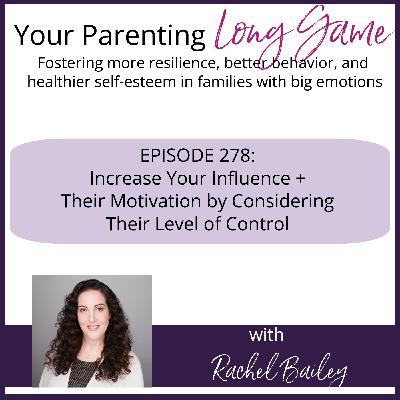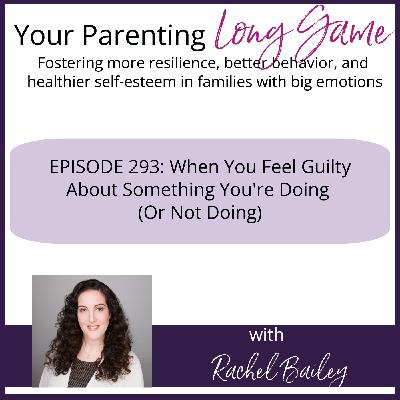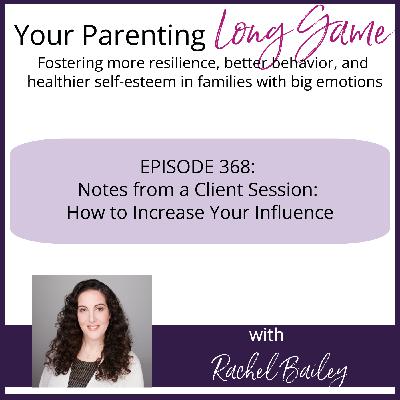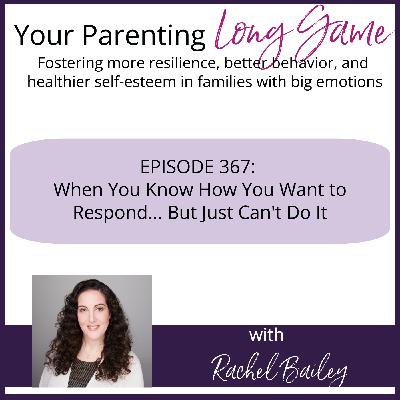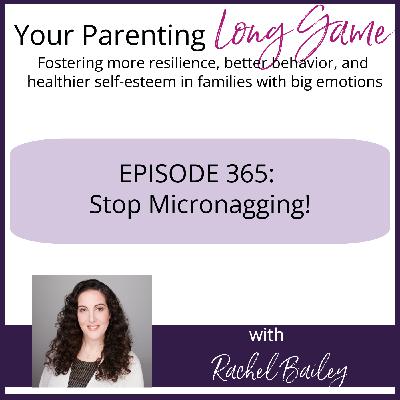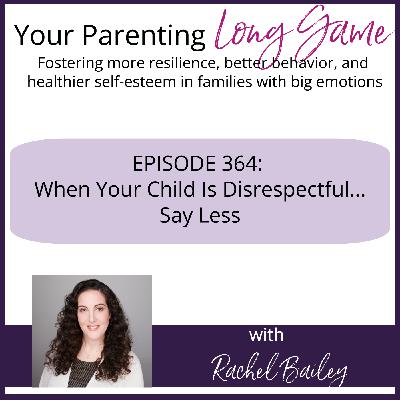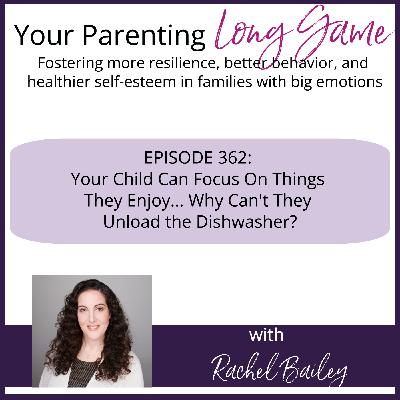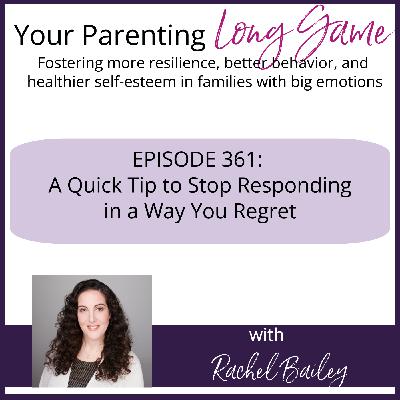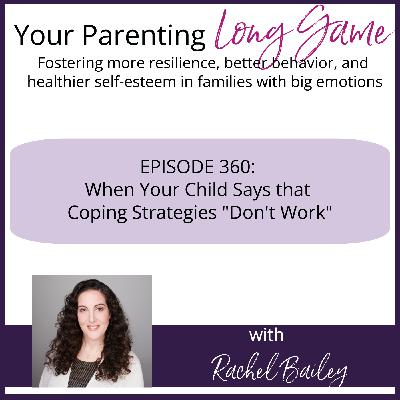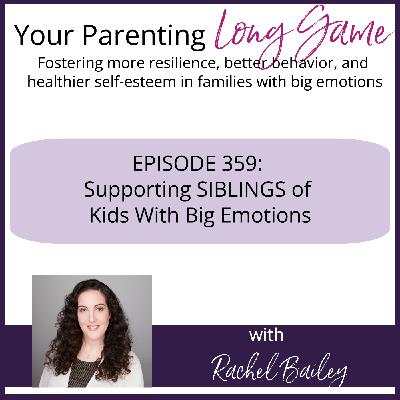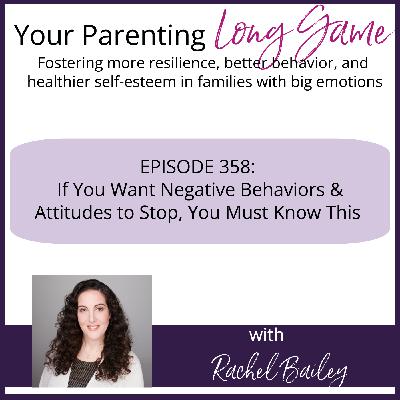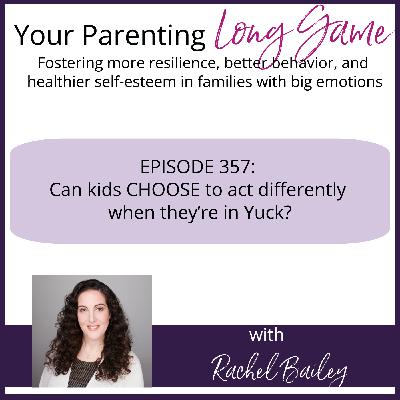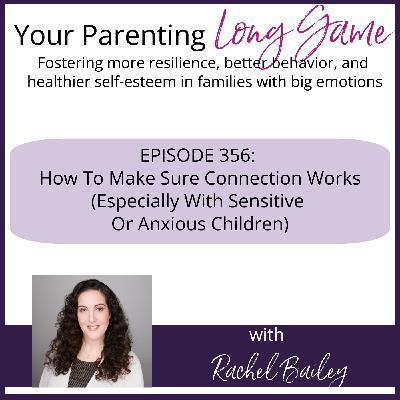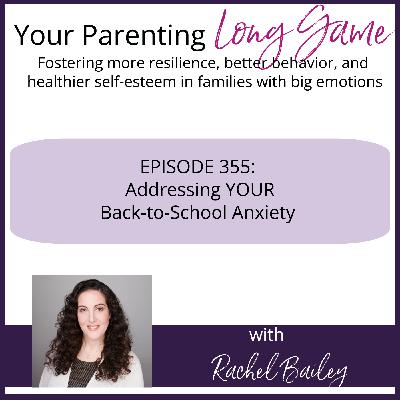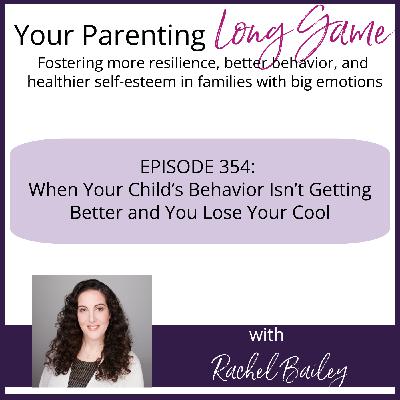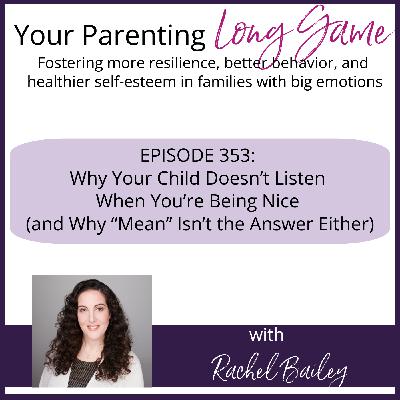Discover Your Parenting Long Game
Your Parenting Long Game

Your Parenting Long Game
Author: Rachel Bailey
Subscribed: 222Played: 13,430Subscribe
Share
Description
This podcast is for parents who not only want to short-term tips for handling current kids' behaviors and moods, but who are exhausted from addressing the same situation over and over and want to find solutions that last much longer into the future.
Because you will receive plans and step-by-step tools, it's also for parents who crave feeling in control -- and who do much better with structure than the chaos traditionally associated with parenting.
Because you will receive plans and step-by-step tools, it's also for parents who crave feeling in control -- and who do much better with structure than the chaos traditionally associated with parenting.
299 Episodes
Reverse
Children with big emotions often want to be in charge. They try to control the schedule, their siblings, and even us! But trying to take away control leads to power struggles… and giving them MORE control doesn't lead to better behavior. The good news is that there is a way to motivate our children to be more flexible and responsible without taking away all of their control or giving them too much of it. In this episode, you'll learn: What leads to better behavior with kids who like to be in control How to easily find the right balance between permissiveness and firmness What our kids really need from us so that they can develop confidence, internal motivation, and a better parent-child relationship - Free coaching calls: https://rachel-bailey.com/coaching/ Facebook group: https://www.facebook.com/groups/RachelBailey Raising Resilience Membership: https://rachel-bailey.com/raising-resilience-membership/
You have an idea in your mind of what you "should" be doing as a parent. But how often do you feel like you're falling short of your own expectations? So many of us feel guilty on a regular basis, and it can be exhausting. But there is something you can do to reduce your guilt (and get some energy back!). In this episode, you'll learn: What happens when we let go of parenting guilt One question we can ask ourselves to turn our guilt into confidence How to create a simple plan that will empower you to parent from your values so you feel less bad about what you've done (or not done) -- Free coaching calls: https://rachel-bailey.com/coaching/ Facebook group: https://www.facebook.com/groups/RachelBailey Raising Resilience Membership: https://rachel-bailey.com/raising-resilience-membership/
When our kids melt down, snap back, or seem resistant, it's easy to think, "This is bad. I need to make this stop." But when we see our child's behavior as a threat, our nervous system gets pulled into the struggle too, and everyone stays stuck longer. The real shift that shortens hard moments doesn't come from controlling behavior. It comes from changing the meaning we give it. In this episode, you'll hear: Why your child's negativity or resistance is a sign of discomfort, not defiance How the story you tell yourself about your child's behavior determines whether situations escalate or resolve What you need in order to help kids' behavior improve more quickly -- Free resources to support you as you're raising children with big emotions Work with Rachel
When our kids aren't listening, we often default to talking more in an attempt to be more clear...more firm...more persuasive. But as we know, our EXTRA words often don't lead to better results. Fortunately, the solution to motivating more responsibility in our kids takes less energy, not more. In this episode, you'll hear: Why a child's "not listening" may not be a listening problem What to say and do so that your child is more likely to do things they don't feel like doing What YOU likely need in order to implement this strategy -- LIVE PLANNING SESSION: When Emotions Control Your Home: Build Your Plan to Calm Emotional Storms (When Nothing Seems to Work) Free resources to support you as you're raising children with big emotions Work with Rachel
As parents, we want to be a steady, positive influence...someone our child trusts, listens to, and feels safe with. But in the hardest moments, that influence often slips away, not because we don't care or aren't trying, but because our child's reactions pull us into doubt, urgency, or over-accommodation. In this episode, I explain why influence breaks down under pressure, and how rebuilding it starts with balancing confidence and connection. In this episode, you'll hear: Why confidence without connection can lead to shame, power struggles, and self-doubt in kids How connection without confidence can actually increase anxiety and resistance What it sounds like in real life to hold firm limits and care about your child's experience so both of you feel safer and more capable -- LIVE PLANNING SESSION: When Emotions Control Your Home: Build Your Plan to Calm Emotional Storms (When Nothing Seems to Work) Free resources to support you as you're raising children with big emotions Work with Rachel
Most parents don't realize that the hardest moments aren't hard because you don't know what to do... They're hard because your child's behavior is directly impacting your energy, your time, or your sanity. In this episode, I'll break down why that matters more than you think, and how to reclaim your sense of control without needing your child to change first. In this episode, you'll hear: The hidden ways your child's behavior affects your ability to stay regulated Why struggling in these moments doesn't mean you're doing anything wrong The simple 3-step process that helps you feel more grounded and effective How to support your child's needs and your own so things start to shift more quickly -- Live Planning Session: When Emotions Control Your Home: Build Your Plan That Finally Brings Peace Free resources to support you as you're raising children with big emotions Work with Rachel
YOU rarely get acknowledged for the emotional load you carry, especially when raising kids with big feelings. In this episode, I'm going to point out some of the things you likely do — even if you don't notice them, and even if you don't do them perfectly! In this episode, you'll hear: A piece of the invisible emotional load you carry that rarely gets noticed How your imperfect effort strengthens your child's confidence and safety What your child would thank you for if they had the words A simple way to finally give yourself credit for the things you do that truly matter -- The checklist: Notice what you're doing Free resources to support you as you're raising children with big emotions Work with Rachel
https://rachel-bailey.com/365It's incredibly exhausting to feel like a broken record, constantly reminding your kids to get ready, start homework, or get off of their device. And these constant reminders, or "micronags," can reduce your influence and impact your relationship. Fortunately, there is another way to motivate more responsible behavior. In this episode, you'll learn: Why micronagging becomes the default, even when we don't want to do it The real reason kids don't follow through the first time, and why it isn't defiance Three practical steps to replace reminders with systems that actually work -- Free resources to support you as you're raising children with big emotions Work with Rachel
When your child rolls their eyes, snaps "You're so annoying," or yells "Whatever!", it's natural to jump in with, "Don't talk to me that way!" or "That's unacceptable." You want to teach them to be respectful... but those reactions usually only make situations worse. In fact, the best thing to do when your child is disrespectful is to do less. In this episode, you'll learn: Why doing less is not "letting them get away with it" and not the same as being weak, passive or permissive How to stay grounded and model regulation instead of reacting to your child's Yuck with your own When and how to address disrespect so that your child learns that it's not acceptable... and so they can actually respond differently in the future -- Free resources to support you as you're raising children with big emotions Work with Rachel
As parents, so many of our decisions in the moment are focused on keeping the peace, calming the meltdown, protecting our nerves. But while that might reduce drama in the short term, it often prevents our children from developing the confidence and resilience they need for long-term success. In this episode, you'll learn why discomfort is essential for growth and how to respond in those hard moments without rescuing, over-explaining, or giving in. In this episode, you'll learn: The hidden ways we unintentionally block our child's resilience by avoiding discomfort Why discomfort is not dangerous, but necessary, for developing confidence and emotional strength A new way to respond when your child is upset, frustrated, or overwhelmed so they learn "I can handle hard things" -- Free resources to support you as you're raising children with big emotions Work with Rachel
Have you ever wondered how your child can spend hours building a virtual world… yet when you ask them to do any daily task, they act like it's torture? In this episode, I explain the REAL reason your child resists everyday tasks and why it has nothing to do with laziness, disrespect, or lack of motivation. Once you understand how the brain responds to stimulation and Yuck, you'll be able to shift from fighting your child's resistance… to understanding it and leading them through it. In this episode, you'll learn: Why your child's brain sees boring tasks as "dangerous" and actively avoids them The difference between motivation strategies and activation strategies and why one works while the other backfires What you can start doing immediately to help your child cooperate more easily (and build confidence at the same time) -- Free cheat sheet: Helping Kids With Daily Tasks Free quiz: The "Everyday Routines" Quiz: What's Your Style? Other free resources to support you as you're raising a child with big emotions Work with Rachel
http://rachel-bailey.com/361When our kids resist, melt down, or push back, our instinct is to get them to calm down or cooperate...fast. We talk more, repeat rules, and try to convince them to "get it together." But the more urgent we become, the more our kids resist and the harder everything feels. Fortunately, there a quick shift can help you respond more effectively, and in a way that you don't regret. In this episode, you'll learn: Why urgency fuels kids' resistance (and why it's so hard to stop being urgent in the moment) How to recognize when your own fight-or-flight response is taking over A simple shift that helps you slow down so that you can regain influence and your child can calm down more quickly -- FREE RESOURCE: Understanding the Yuck Curve Other free resources to support you as you're raising a child with big emotions Join Rachel's Facebook group Work with Rachel
When our kids are upset, we often suggest strategies to help them calm down or manage tough situations—like taking deep breaths, counting to ten, or breaking down assignments into smaller steps. But when those strategies don't instantly erase the discomfort, both kids (and parents!) often conclude that "nothing works." In this episode, you'll learn: How to assess whether a strategy really "works" or not (so kids stop insisting that nothing works!) A powerful exercise you can try with your child to help them build tolerance for discomfort Simple ways to introduce the idea of tolerance in everyday situations (like chores, screen time, or schoolwork) -- FREE RESOURCE: Understanding the Yuck Curve Other free resources to support you as you're raising a child with big emotions Join Rachel's Facebook group Work with Rachel
When you're raising a child with big emotions, it's natural for an "easier" sibling to get less of your time and attention. But a more flexible child may pay a quiet price -- giving in to avoid conflict, hiding their feelings, or believing they matter less. Chances are, you've noticed that but aren't sure what to do. Fortunately, a few small shifts can make a big difference in how they view themselves (and will can make you feel less guilty). In this episode, you'll learn how to: Spot the signs that an "easier" child is struggling Show them that they matter (even if you've told them and it hasn't helped) Help them learn to stand up for themselves -- FREE RESOURCE: Understanding the Yuck Curve Other free resources to support you as you're raising a child with big emotions Join Rachel's Facebook group Work with Rachel
If you're raising a child with big emotions, you know how draining it can be when they melt down, argue, refuse to cooperate, or fall apart after the smallest setback. It's easy to assume these behaviors are defiance, disrespect, or laziness… but most of the time, they're actually signs that your child is missing something that you can provide! In this episode, you'll learn: The two main sets of skills kids with big emotions often lack How to recognize behaviors that signal a missing skill rather than misbehavior Why addressing missing skills reduces drama now and builds your child's long-term confidence and self-esteem -- FREE WORKSHOP: Stop Working So Hard to Get Your Kids to Calm Down Other free resources to support you as you're raising a child with big emotions Join Rachel's Facebook group Work with Rachel
Many kids with big emotions have big reactions when things don't go their way. They may yell, slam doors, roll their eyes, or even say disrespectful things when they are upset. And while it's natural for parents to think that our children are choosing to be rude or defiant, something else is actually happening instead. In this episode, you'll learn: What's going on in the brain that explains why Yuck behaviors are not a conscious choice Why this is NOT an excuse for negative behavior How kids can learn to handle their "Yuck Urge"… and how this builds their confidence rather than eroding it -- FREE RESOURCE: Understanding the Yuck Curve Other free resources Join Rachel's Facebook group Work with Rachel
You've heard how important it is to have a strong connection with your children. But when we are raising kids who are anxious or sensitive, sometimes our attempts to connect with them are more about fixing a problem than about making a genuine connection… and they feel that! The good news is, one little change can improve your influence and help your child handle their uncomfortable moments with less stress (for them) and less exhaustion (for you). In this episode, you'll learn: What genuine connection looks like and sounds like How this strong parent-child connection SAVES you energy A simple metaphor to help you remember how to make this type of connection in the moment -- FREE RESOURCE: Understanding the Yuck Curve Other free resources Join Rachel's Facebook group Work with Rachel
A new school year can bring excitement, but for kids with big emotions, it may also bring worry, "what if" questions, and knots in the stomach. As parents, we want to jump in with reassurances, solutions, or distractions, but those attempts -- which are actually signs of our anxiety -- often increase our kids' Yuck. Fortunately, a simple strategy can help us center ourselves so we can support our children more effectively. In this episode, you'll learn: Why we need to regulate ourselves before we try to help our kids Simple actions we can take reduce their anxiety (and our discomfort with their discomfort) What our children need in order to handle their transition to school with confidence, even when we're not there to help -- FREE RESOURCE: "Discomfort is not dangerous" printable FREE RESOURCE: Understanding the Yuck Curve Join Rachel's Facebook group Work with Rachel
Let's be honest: Raising a child with big emotions can take a lot of energy. Dealing with resistance, dramatic reactions, and everything else in your life can be exhausting, so it's natural to lose your patience (and, unfortunately, your influence). This episode shares a specific strategy to stay calm and keep your influence… even when it's taking longer for your children's behavior to improve than you'd like. In this episode, you'll learn: The 3 main reasons kids don't do what we ask Why we tend to lose our cool when there is a setback in our child's progress A simple technique to help you stay calm and supportive rather than resentful of your child's behavior -- Resources to support you as you're raising children with big emotions Work with Rachel Join Rachel's Facebook group
Having a strong relationship with our kids is a huge priority for many of us. So when we're setting limits or addressing our kids' big emotions, we usually approach them in a nice (or what we think is "respectful") way. Unfortunately, many kids won't listen – or feel confident – when we're being so nice. So how can we raise kids who follow limits and can handle hard feelings… without ruining our relationship? In this episode, you'll learn: What it really means to "respect" your children One question you can ask yourself when you're struggling to influence your children What simple quality leads to long-term security and healthier self-esteem for your kids (and less guilt for you) -- Join Rachel's Facebook group Resources to support you as you're raising children with big emotions Work with Rachel


